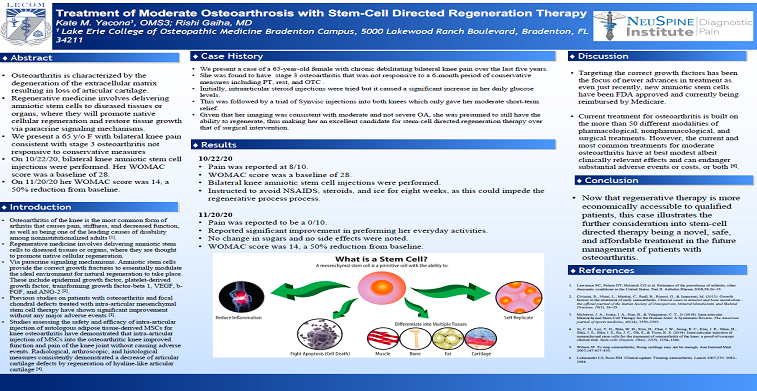2021 FSA Posters
P013: TREATMENT OF MODERATE OA WITH STEM-CELL DIRECTED REGENERATION THERAPY
Kate Yacona, OMSIII1; Rishi Gaiha, MD2; 1Lake Erie College of Osteopathic Medicine-Bradenton, Florida; 2NeuSpine Institute- Diagnostic Pain
Introduction: Osteoarthritis of the knee is the most common form of arthritis that causes pain, stiffness, and decreased function, as well as being one of the leading causes of disability among noninstitutionalized adults. Osteoarthritis is characterized by the degeneration of the extracellular matrix resulting in loss of articular cartilage. Regenerative medicine involves delivering amniotic stem cells which provide the correct growth fractures to essentially modulate the ideal environment for natural regeneration to take place. These include epidermal growth factor, platelet-derived growth factor, transforming growth factor-beta 1, VEGF, b-FGF, and ANG-2. Targeting these factors has been the focus of newer advances in treatment as even just recently, new amniotic stem cells have been FDA approved and currently being reimbursed by Medicare. Current treatment for osteoarthritis is built on the more than 50 different modalities of pharmacological, nonpharmacological, and surgical treatments. However, the current and most common treatments for moderate osteoarthritis have at best modest albeit clinically relevant effects and can endanger substantial adverse events or costs, or both. Previous studies on patients with osteoarthritis and focal chondral defects treated with intra-articular mesenchymal stem cell therapy have shown significant improvement without any major adverse events. Other studies assessing the safety and efficacy of intra-articular injection of autologous adipose tissue-derived MSCs for knee osteoarthritis have demonstrated that intra-articular injection of MSCs into the osteoarthritic knee improved function and pain of the knee joint without causing adverse events. Radiological, arthroscopic, and histological measures consistently demonstrated a decrease of articular cartilage defects by regeneration of hyaline-like articular cartilage.
Case: We present a case of a 65-year-old female with chronic debilitating bilateral knee pain over the last five years. She was found to have stage 3 osteoarthritis that was not responsive to a 6-month period of conservative measures including PT, rest, and OTC . Initially, intraarticular steroid injections were tried but it caused a significant increase in her daily glucose levels. This was followed by a trial of Synvisc injections into both knees which only gave her moderate short-term relief. Given that her imaging was consistent with moderate OA, she was presumed to still have the ability to regenerate, making her an excellent candidate for stem-cell directed regeneration therapy over that of surgical intervention. Her baseline WOMAC score was 28. She opted for bilateral knee amniotic stem cell injections and was instructed to avoid NSAIDS, steroids, and ice for eight weeks, as this could impede the regenerative process. The following month, her pain was reported to be a 0/10, with significant improvement in performing her everyday activities. Her follow up WOMAC score was a 14, which was a 50% reduction from baseline.
Discussion: Now that regenerative therapy is more economically accessible to qualified patients, this case illustrates the further consideration into stem-cell directed therapy being a novel, safe, and affordable treatment in the future management of patients with osteoarthritis.

